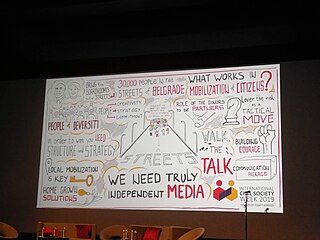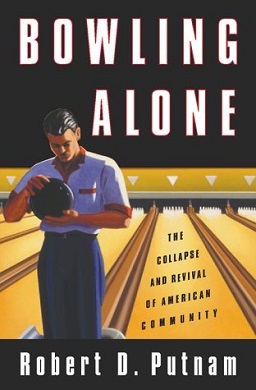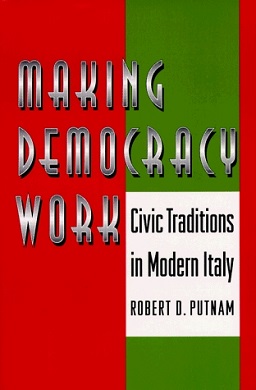Communitarianism is a philosophy that emphasizes the connection between the individual and the community. Its overriding philosophy is based on the belief that a person's social identity and personality are largely molded by community relationships, with a smaller degree of development being placed on individualism. Although the community might be a family, communitarianism usually is understood, in the wider, philosophical sense, as a collection of interactions, among a community of people in a given place, or among a community who share an interest or who share a history. Communitarianism usually opposes extreme individualism and rejects extreme laissez-faire policies that deprioritize the stability of the overall community.
Social capital is "the networks of relationships among people who live and work in a particular society, enabling that society to function effectively". It involves the effective functioning of social groups through interpersonal relationships, a shared sense of identity, a shared understanding, shared norms, shared values, trust, cooperation, and reciprocity. Some have described it as a form of capital that produces public goods for a common purpose, although this does not align with how it has been measured.

The term multiculturalism has a range of meanings within the contexts of sociology, political philosophy, and colloquial use. In sociology and in everyday usage, it is a synonym for ethnic pluralism, with the two terms often used interchangeably, and for cultural pluralism in which various ethnic and cultural groups exist in a single society. It can describe a mixed ethnic community area where multiple cultural traditions exist or a single country within which they do. Groups associated with an indigenous, aboriginal or autochthonous ethnic group and settler-descended ethnic groups are often the focus.
A local community has been defined as a group of interacting people living in a common location. The word is often used to refer to a group that is organized around common values and is attributed with social cohesion within a shared geographical location, generally in social units larger than a household. The word can also refer to the national community or global community. The word "community" is derived from the Old French communauté which is derived from the Latin communitas, a broad term for fellowship or organized society.

Civil society can be understood as the "third sector" of society, distinct from government and business, and including the family and the private sphere. By other authors, civil society is used in the sense of 1) the aggregate of non-governmental organizations and institutions that advance the interests and will of citizens or 2) individuals and organizations in a society which are independent of the government.

Democratization, or democratisation, is the structural government transition from an authoritarian government to a more democratic political regime, including substantive political changes moving in a democratic direction.

Bowling Alone: The Collapse and Revival of American Community is a 2000 nonfiction book by Robert D. Putnam. It was developed from his 1995 essay entitled "Bowling Alone: America's Declining Social Capital". Putnam surveys the decline of social capital in the United States since 1950. He has described the reduction in all the forms of in-person social intercourse upon which Americans used to found, educate, and enrich the fabric of their social lives. He argues that this undermines the active civic engagement which a strong democracy requires from its citizens.

Civic engagement or civic participation is any individual or group activity addressing issues of public concern. Civic engagement includes communities working together or individuals working alone in both political and non-political actions to protect public values or make a change in a community. The goal of civic engagement is to address public concerns and promote the quality of the community.
Social disruption is a term used in sociology to describe the alteration, dysfunction or breakdown of social life, often in a community setting. Social disruption implies a radical transformation, in which the old certainties of modern society are falling away and something quite new is emerging. Social disruption might be caused through natural disasters, massive human displacements, rapid economic, technological and demographic change but also due to controversial policy-making.
Community building is a field of practices directed toward the creation or enhancement of community among individuals within a regional area or with a common need or interest. It is often encompassed under the fields of community organizing, community organization, community work, and community development.

Better Together: Restoring the American Community is both a book and website published as an initiative of the Saguaro Seminar conducted at Harvard University's John F. Kennedy School of Government. The initiative is aimed at facilitating rapid and extensive community development, particularly within the United States and uses a book with the same title by Robert Putnam and Lewis M. Feldstein as its primary reference text.
Associationalism or associative democracy is a political movement in which "human welfare and liberty are both best served when as many of the affairs of a society as possible are managed by voluntary and democratically self-governing associations." Associationalism "gives priority to freedom in its scale of values, but it contends that such freedom can only be pursued effectively if individuals join with their fellows"

Making Democracy Work: Civic Traditions in Modern Italy (ISBN 9780691037387) is a 1993 book written by Robert D. Putnam. Published by Princeton University Press, the book's central thesis is that social capital is key to high institutional performance and the maintenance of democracy.
Sidney Verba was an American political scientist, librarian and library administrator. His academic interests were mainly American and comparative politics. He was the Carl H. Pforzheimer University Professor at Harvard University and also served Harvard as the director of the Harvard University Library from 1984 to 2007.
The following events related to sociology occurred in the 2000s.
Criticism of multiculturalism questions the ideal of the maintenance of distinct ethnic cultures within a country. Multiculturalism is a particular subject of debate in certain European nations that are associated with the idea of a nation state. Critics of multiculturalism may argue against cultural integration of different ethnic and cultural groups to the existing laws and values of the country. Alternatively critics may argue for assimilation of different ethnic and cultural groups to a single national identity.

Lyda Judson Hanifan, better known as L. J. Hanifan, is credited with introducing the concept of social capital. Robert Putnam in his book, Bowling Alone (2000) credits a 1916 paper by Hanifan as the first recorded instance of the term. Hanifan also authored a book published in 1920 that contains a chapter entitled "Social Capital".
A community is "a body of people or things viewed collectively". According to [[Steven Brintgregates of people who share common activities and/or beliefs and who are bound together principally by relations of affect, loyalty, common values, and/or personal concern – i.e., interest in the personalities and life events of one another".
Sex differences in social capital are debated differences between men and women's ability to achieve their aims through social constructs such as trust, norms and networks. Social capital is often seen as the missing link in development. Social networks facilitate access to resources and protect the commons, whilst co-operation makes markets work more efficiently. Social capital has been thought of as women's capital as whereas there are gendered barriers to accessing economic capital, women's role in family, and community ensures that they have strong networks. There is potential that the concept can help to bring women's unpaid 'community and household labour', vital to survival and development, to the attention of economists. However, research analysing social capital from a gendered perspective is rare, and the notable exceptions are very critical.
Carl Boggs is a social science and film studies professor at the National University in Los Angeles.








